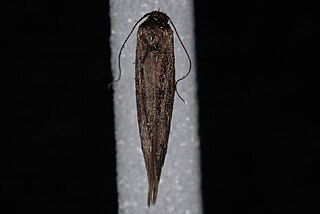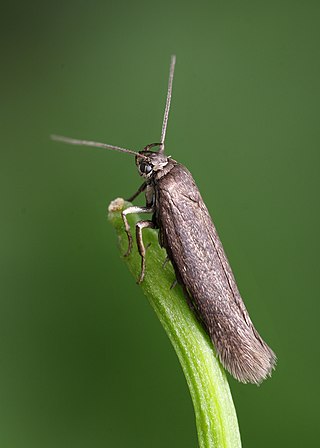
Scythrididae is a family of small moths in the superfamily Gelechioidea. The family is sometimes included in the Xyloryctidae as a subfamily Scythridinae, but the Xyloryctidae themselves have sometimes been included in the Oecophoridae as subfamily. Scythrididae adults are smallish to mid-sized moths, which when at rest appear teardrop-shaped.

Scythris limbella is a moth of the family Scythrididae first described by the Danish zoologist Johan Christian Fabricius. It is found in Asia and Europe.

Scythris is a genus of gelechioid moths. It is the type genus of the flower moth family, which is sometimes included as a subfamily in the Xyloryctidae, or together with these merged into the Oecophoridae. The genus was erected by Jacob Hübner in 1825.
Palaeomicroides fasciatella is a species of moth belonging to the family Micropterigidae. It was described by Syuti Issiki in 1931. It is endemic to Taiwan.

Scythris heinemanni is a flower moth of the family Scythrididae and it is included in the knochella species group. It is found in mainland of France and Italy.

Scythris arachnodes is a moth of the family Scythrididae. It is found on the Canary Islands.

Scythris petrella is a moth of the family Scythrididae. It is found on the Canary Islands.

Scythris cicadella, the sand owlet, is a moth of the family Scythrididae found in Europe. It was first described by Philipp Christoph Zeller in 1839.

Scythris inspersella, the Norfolk owlet, is a moth of the family Scythrididae, first described by the German entomologist Jacob Hübner in 1817. It has a Holarctic distribution.
Scythris laminella is a moth of the family Scythrididae. It was described by Michael Denis and Ignaz Schiffermüller in 1775. It is found in most of Europe and Central Asia.

Scythris noricella is a moth of the family Scythrididae. It was described by Philipp Christoph Zeller in 1843. It has a Holarctic distribution. In Europe, it is found on most of the continent, except Ireland, Great Britain, the Netherlands, Denmark, the Iberian Peninsula, the Baltic region and most of the Balkan Peninsula.

Scythris sinensis is a moth of the family Scythrididae first described by the Austrian entomologists Baron Cajetan von Felder and Alois Friedrich Rogenhofer in 1875. The moth is found in Asia, Europe and North America.
Scythris tributella is a moth of the family Scythrididae. It was described by Philipp Christoph Zeller in 1847. It is found in central and southern Europe, North Africa (Libya) and Russia, Georgia, Turkey and Turkmenistan.
Scythris sanae is a moth of the family Scythrididae. It was described by Bengt Å. Bengtsson in 2002. It is found in Yemen.
Scythris fallacella is a moth of the family Scythrididae found in Europe.

Scythris grandipennis is a moth of the family Scythrididae found in Europe.
Scythris fuscoaenea is a moth of the family Scythrididae found in Europe.

Scythris picaepennis is a moth of the family Scythrididae first described by Adrian Hardy Haworth in 1828. It is found in Europe.












